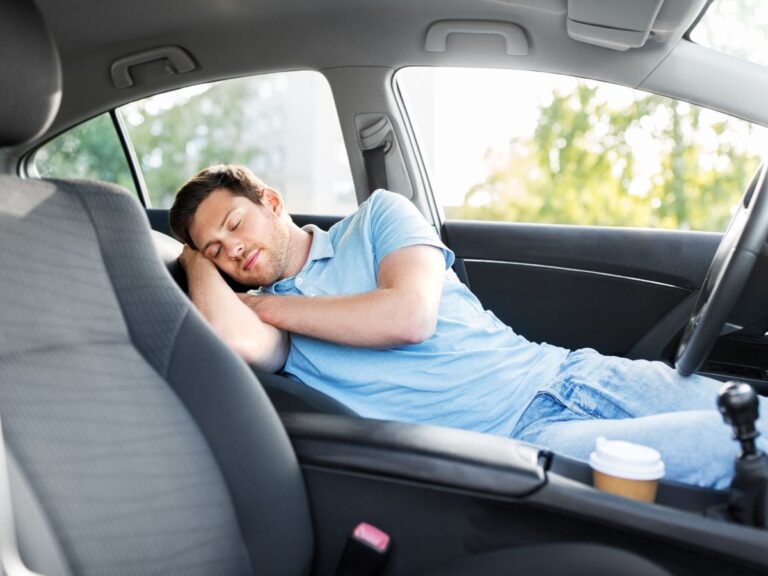Is It Safe to Sleep in My Car Overnight With the Windows Closed?
Sleeping in your car overnight with the windows closed can be unsafe due to the risk of carbon monoxide poisoning from limited air circulation and exhaust fumes. Proper ventilation is vital to prevent health hazards like headaches, dizziness, and nausea caused by carbon monoxide exposure. Safeguard your safety by using carbon monoxide detectors. If you want to explore more about the risks, benefits, air quality concerns, and alternative ventilation methods for sleeping in your car, there are important considerations and strategies to keep in mind.
Risks of Sleeping in a Closed Car
Sleeping in a closed car without proper ventilation can lead to an increased risk of carbon monoxide poisoning. When the windows are shut, the air circulation inside the vehicle becomes restricted. This lack of fresh air exchange can result in a buildup of carbon monoxide from sources like the car’s exhaust fumes, posing a serious threat to your health and safety.
To mitigate this risk, it is important to implement safety measures before sleeping in a closed car. To start with, make sure that at least one window is slightly open to allow for adequate air circulation. This simple step can help prevent the accumulation of harmful gases inside the vehicle. Additionally, consider installing a carbon monoxide detector in your car to provide an early warning in case levels become dangerous. Regular maintenance of the vehicle’s exhaust system is also crucial to minimize the chances of leaks or issues that could lead to carbon monoxide exposure. By prioritizing air circulation and implementing these safety measures, you can reduce the risks associated with sleeping in a closed car.
Benefits of Car Sleeping
In addition, sleeping in your car with the windows closed offers you privacy and security, as you can rest without worrying about external disturbances. It also provides convenience and flexibility, allowing you to choose different locations to park and sleep in as needed. Car sleeping is also a cost-effective option, saving you money on accommodation while still providing a comfortable resting place.
Privacy and Security
For enhanced privacy and security while sleeping in your car, it is advisable to park in well-lit areas with minimal foot traffic. Privacy concerns are paramount when choosing a spot for car sleeping. Opt for locations away from busy streets and secluded from public view to minimize the risk of unwanted attention. Security measures such as locking your doors and keeping valuable items out of sight can further enhance safety.
When considering noise levels, aim to park in areas with minimal disturbances. Avoid locations close to bars, clubs, or high-traffic roads that could disrupt your sleep. Additionally, utilizing lighting options like parking under street lamps or in designated overnight parking areas can deter potential intruders and provide a sense of safety.
Convenience and Flexibility
How does car sleeping offer unparalleled convenience and flexibility for your on-the-go lifestyle? Travel flexibility is a key advantage, allowing you to rest wherever you find parking, making long road trips or unexpected delays more manageable. Despite safety concerns, if done correctly, car sleeping can provide a safe and secure environment. Ensuring your doors are locked, windows cracked for ventilation, and choosing well-lit, public parking areas are essential precautions. Additionally, the comfort and convenience of having your essentials within reach can make car sleeping a practical option. While air quality may be a worry, properly ventilating your vehicle and avoiding idling the engine can help mitigate this issue. Overall, the ability to adapt to different environments and situations makes car sleeping a valuable choice for those seeking flexibility in their travel plans while prioritizing safety and comfort.
Cost-Effective Option
Considering the financial aspect, car sleeping proves to be a cost-effective alternative that offers various benefits for those looking to save money on accommodation while traveling. Privacy concerns are mitigated as you have control over who can see inside your car. By utilizing window covers or tinted windows, you can guarantee your privacy while resting. Noise disturbances are also reduced compared to staying in a busy hostel or hotel, providing a quieter environment for a more peaceful sleep. Additionally, the cost of booking a room for the night is eliminated, saving you significant money over time. Car sleeping allows you to reallocate funds to other travel expenses or activities. While ensuring your safety and taking necessary precautions, opting for car sleeping can be a practical solution for budget-conscious travelers. With the right preparations and awareness of your surroundings, this cost-effective option can provide a comfortable and economical way to rest during your travels.
Air Quality Concerns
When sleeping in your car with the windows closed, it’s important to take into account air quality concerns. Proper ventilation is vital for breathing fresh air, especially to minimize the risk of carbon monoxide buildup. Monitoring these factors can help guarantee a safe sleeping environment inside your vehicle.
Ventilation for Breathing
Proper ventilation is essential when sleeping in your car with the windows closed to guarantee sufficient air quality for breathing. Ensuring adequate airflow inside the vehicle is vital to maintain ideal oxygen levels and prevent potential health effects associated with poor air quality. Here are some key considerations to enhance ventilation for breathing:
- Implement breathing techniques: Practice deep breathing exercises before sleeping to promote relaxation and improve oxygen circulation in the body.
- Utilize air purifiers: Consider using portable air purifiers designed for cars to help remove pollutants and allergens from the air inside your vehicle.
- Open windows periodically: If safe to do so, crack open the windows intermittently to allow fresh air to circulate and prevent the buildup of stale air.
Carbon Monoxide Risk
Check that your car’s ventilation system is working at its best to reduce the risk of carbon monoxide buildup when sleeping with the windows closed. Proper ventilation solutions are essential to guarantee a safe sleeping environment in your car. Carbon monoxide, a colorless and odorless gas produced by your car’s engine, can accumulate inside the vehicle if not properly ventilated. Warning signs of carbon monoxide poisoning include dizziness, headache, nausea, confusion, and fatigue. To mitigate this risk, make sure that your car’s exhaust system is well-maintained, and never sleep in a running vehicle, even with the windows open. Installing a carbon monoxide detector in your car can provide an added layer of safety by alerting you to dangerous levels of this gas. Additionally, parking in well-ventilated areas, cracking the windows slightly, and avoiding sleeping in a car that is idling can all help reduce the likelihood of carbon monoxide exposure while sleeping in your vehicle. Stay vigilant about carbon monoxide risks to safeguard your well-being during overnight stays in your car.
Temperature Regulation
Maintaining a stable internal temperature while sleeping in your car with the windows closed is crucial for your comfort and safety. To regulate the temperature effectively, consider the following:
- Insulation Benefits: Make sure your car has adequate insulation to trap heat during colder nights and keep the interior cool on hot days. Proper insulation can help maintain a comfortable temperature regardless of external conditions.
- Cooling Strategies: Implement cooling strategies such as using window shades to block out sunlight and reduce heat buildup, or utilizing a battery-operated fan to circulate air within the car. These methods can help prevent overheating and ensure a pleasant sleeping environment.
- Ventilation: While keeping the windows closed is important for safety, cracking a window slightly can help promote air circulation and prevent stuffiness. This balance between insulation and ventilation is key to regulating the temperature inside your car effectively. By incorporating these tips, you can enhance your sleeping experience and stay safe while resting in your vehicle.
Carbon Monoxide Risks
You must be aware of the potential dangers of carbon monoxide when sleeping in your car with the windows closed. Proper ventilation is essential to prevent a buildup of this toxic gas. Exposure to high levels of carbon monoxide can lead to serious health risks, making it vital to take precautions.
Carbon Monoxide Dangers
Exposure to carbon monoxide while sleeping in a car with the windows closed can pose severe health risks due to the colorless, odorless gas’s ability to displace oxygen in the bloodstream. Carbon monoxide awareness is vital for understanding the potential dangers associated with this gas. Here are some important points to keep in mind:
- Symptoms: Carbon monoxide poisoning can lead to symptoms like headache, dizziness, nausea, weakness, confusion, and in severe cases, unconsciousness. Being mindful of these signs can help you identify a potential threat early.
- Prevention: To prevent carbon monoxide buildup in your car while sleeping, it is crucial to ensure proper ventilation. Keeping a window slightly cracked can help fresh air circulate and reduce the risk of carbon monoxide accumulation.
- Carbon Monoxide Detectors: Consider investing in a carbon monoxide detector for your car. These devices can alert you if dangerous levels of carbon monoxide are present, providing an additional layer of safety.
Ventilation Importance
To mitigate the risks of carbon monoxide poisoning while sleeping in your car with the windows closed, ensuring adequate ventilation is paramount. Ventilation strategies play an important role in maintaining a safe environment inside your vehicle. Proper air circulation is essential to prevent the buildup of carbon monoxide, a colorless, odorless gas that can be deadly in high concentrations.
When planning to sleep in your car with the windows closed, consider implementing ventilation strategies such as cracking open a window slightly to allow fresh air to enter and circulate within the vehicle. This simple action can greatly reduce the risk of carbon monoxide buildup while you rest.
Additionally, if your car is equipped with a ventilation system, make sure to use it effectively to maintain a continuous flow of fresh air. Regularly checking and maintaining your vehicle’s ventilation system can help ensure that air circulation remains efficient and reduces the chances of carbon monoxide accumulating to dangerous levels. Remember, proper ventilation is key to a safe and comfortable sleeping environment in your car.
Health Risks Associated
Ventilating your vehicle effectively is crucial to mitigate the health risks associated with carbon monoxide exposure while sleeping in your car with the windows closed. Carbon monoxide is a colorless, odorless gas produced by your car’s engine that can be deadly in high concentrations. Here are some health concerns and sleeping conditions to be aware of:
- Carbon Monoxide Poisoning: Breathing in carbon monoxide can lead to symptoms like dizziness, nausea, confusion, and even death. Make sure your car’s exhaust system is in good condition to prevent leaks.
- Limited Air Circulation: With the windows closed, there is a lack of fresh air circulation inside the car. This can increase the concentration of carbon monoxide, heightening health risks.
- Sleep Quality: Poor ventilation can lead to poor sleep quality due to discomfort, difficulty breathing, and potential exposure to harmful gases. Consider cracking a window slightly to allow for some airflow while maintaining safety.
Prioritize your safety by being mindful of these health risks and sleeping conditions when deciding to sleep in your car with the windows closed.
Safety Precautions to Take
For enhanced safety while sleeping in your car with windows closed, it is important to implement specific measures to guarantee proper airflow and ventilation. Safety measures are essential to avoid potential risks associated with sleeping in an enclosed space. Firstly, before settling in for the night, make sure that your vehicle is parked in a well-ventilated area. This can help in maintaining a fresh air supply within the car. Additionally, consider cracking open a window slightly to allow for cross ventilation. Ventilation strategies like this can greatly improve air circulation and prevent the buildup of harmful gases. It is also advisable to invest in a carbon monoxide detector for added safety. This device can alert you if dangerous levels of carbon monoxide are detected inside your vehicle. Lastly, avoid running the engine or using fuel-burning devices inside the car to minimize the risk of carbon monoxide poisoning. By following these safety precautions and ventilation strategies, you can sleep in your car with windows closed more securely.
Legal Considerations
When contemplating sleeping in your car with windows closed, it is important to be mindful of the legal considerations surrounding this practice. Here are some key points to keep in mind:
- Legal implications: Sleeping in your car with the windows closed may have legal implications depending on the laws in the area where you park. Some jurisdictions may have regulations against sleeping in vehicles, especially with the windows closed, due to safety concerns.
- Liability issues: If something were to happen while you are sleeping in your car with the windows closed, there could be liability issues to think about. For example, if there is a medical emergency or a safety hazard, the responsibility could fall on you for not being able to respond appropriately.
- Emergency response: In case of an emergency, such as a medical issue or a threat to your safety, sleeping with the windows closed may hinder emergency responders from quickly accessing and assisting you. It is important to think about how this practice may impact emergency response times.
Alternative Ventilation Methods
To ensure ample airflow while sleeping in your car with the windows closed, consider utilizing alternative ventilation methods. Roof venting systems are a reliable option for enhancing air circulation within your vehicle. These vents are designed to expel stale air and draw in fresh air, creating a more comfortable sleeping environment. Installing a roof vent can greatly reduce the risk of carbon monoxide buildup and improve overall air quality inside the car.
Another effective method is utilizing fan circulation. Battery-operated or solar-powered fans can help keep the air moving throughout the vehicle, preventing it from becoming stuffy or stagnant. Placing a fan near a window can help draw in fresh air from outside, while also aiding in the removal of warm, humid air from the interior.
Hygiene and Comfort Tips
Consider implementing a regular cleaning routine and investing in moisture-absorbing products to maintain hygiene and enhance comfort while sleeping in your car with the windows closed. Hygiene is important for your well-being during extended car stays. Here are some hygiene tips and comfort suggestions to help you stay fresh and comfortable:
- Regular Cleaning Routine: Wipe down surfaces with disinfectant wipes to remove dust, dirt, and germs. Vacuum the interior to keep it free of debris that could impact air quality.
- Moisture-Absorbing Products: Use moisture-absorbing products like silica gel packets or dehumidifiers to prevent mold and mildew growth, which can lead to unpleasant odors and respiratory issues.
- Comfortable Bedding: Invest in comfortable bedding such as memory foam mattress toppers or sleeping bags to ensure a good night’s rest. This will help you wake up feeling refreshed and ready for the day ahead.
Emergency Preparedness
Prepare an emergency kit containing essential supplies such as water, non-perishable food items, a flashlight, and a first aid kit, to guarantee your safety and well-being while sleeping in your car with the windows closed. In addition to the emergency kit, consider shelter options if you need to evacuate your vehicle due to unforeseen circumstances. Be aware of nearby locations where you can seek shelter in case of emergencies, such as a public building or a designated evacuation center.
Furthermore, make sure to equip yourself with survival skills to handle unexpected situations. Learn basic first aid procedures, how to signal for help, and essential navigation skills. Understanding how to stay safe and secure in challenging situations is vital for your well-being while sleeping in your car. By being prepared with the necessary supplies and knowledge, you can mitigate risks and guarantee your safety during overnight stays in your vehicle. Remember, being proactive in emergency preparedness is key to a secure and comfortable experience.
Conclusion and Final Thoughts
In summarizing the overall importance of emergency preparedness while sleeping in your car with windows closed, it is essential to emphasize the importance of proactive planning and readiness for unexpected situations.
When considering the quality of sleep while resting in your car with the windows closed, remember that proper preparation can greatly impact your comfort and safety. Factors such as noise disturbances can affect your ability to rest peacefully. Below are three key points to keep in mind for a restful and secure experience:
- Utilize earplugs: Earplugs can help minimize noise disturbances from outside your vehicle, promoting better sleep quality.
- Invest in window shades: Blocking out excess light and insulating against external sounds can contribute to a more peaceful sleeping environment.
- Keep emergency supplies accessible: Be prepared for any unforeseen events by having essential items like a flashlight, water, and a phone charger within reach.
Prioritizing Safety and Comfort When Sleeping in a Closed Car Overnight
To sum up, sleeping in a closed car overnight can pose serious risks such as poor air quality, temperature regulation issues, and potential carbon monoxide exposure. However, there are alternative ventilation methods and hygiene tips that can help mitigate these dangers. It is vital to prioritize safety and comfort when considering sleeping in a car, and to always be prepared for emergencies. Ultimately, weighing the benefits and risks is essential in making an informed decision.







